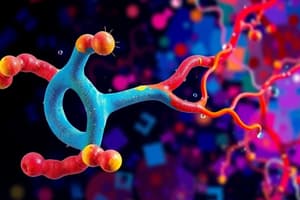Podcast
Questions and Answers
Which factor has the greatest influence on the intensity of a drug's effect?
Which factor has the greatest influence on the intensity of a drug's effect?
- Genetic factors of the individual
- Concentration at the receptor site (correct)
- Frequency of drug administration
- Drug receptor status
What typically occurs as a result of tolerance to a drug?
What typically occurs as a result of tolerance to a drug?
- Enhanced efficacy with each subsequent dose
- Consistent drug response regardless of administration frequency
- Diminished response to the same concentration over time (correct)
- Increased receptor density at the cell surface
Which of the following best describes the adaptation mechanisms associated with tolerance?
Which of the following best describes the adaptation mechanisms associated with tolerance?
- Temporary increase in drug receptors
- Regulation of receptor number or functionality (correct)
- Unchanged receptor status despite drug exposure
- Permanent loss of receptor function
Which of these factors would NOT influence an individual's response to a drug?
Which of these factors would NOT influence an individual's response to a drug?
What is the role of receptor turnover in pharmacology?
What is the role of receptor turnover in pharmacology?
What is a likely result of increased drug administration frequency?
What is a likely result of increased drug administration frequency?
How can drug interactions occur according to pharmacological principles?
How can drug interactions occur according to pharmacological principles?
Which statement about receptor density is accurate?
Which statement about receptor density is accurate?
What happens to receptor functionality during the tolerance phenomenon?
What happens to receptor functionality during the tolerance phenomenon?
What occurs when receptors are internalized but retain their phosphorylation level?
What occurs when receptors are internalized but retain their phosphorylation level?
How is slow upregulation characterized in the context of receptor activity?
How is slow upregulation characterized in the context of receptor activity?
In the context of pharmacological tolerance, which of the following statements is accurate?
In the context of pharmacological tolerance, which of the following statements is accurate?
What phenomenon occurs when there is chronic stimulation of receptors with antagonists?
What phenomenon occurs when there is chronic stimulation of receptors with antagonists?
What role does ubiquitylation play in receptor downregulation?
What role does ubiquitylation play in receptor downregulation?
What is the significance of glutamate ionotropic receptors in the context of synaptic plasticity?
What is the significance of glutamate ionotropic receptors in the context of synaptic plasticity?
What is a major characteristic of tolerance in relation to medication effects?
What is a major characteristic of tolerance in relation to medication effects?
Which phenomenon results from overactivation of one receptor that causes desensitization of other receptors sharing the same pathway?
Which phenomenon results from overactivation of one receptor that causes desensitization of other receptors sharing the same pathway?
How does desensitization specifically affect metabotropic receptors compared to ion channels?
How does desensitization specifically affect metabotropic receptors compared to ion channels?
What occurs during the rapid downregulation phase of receptor modulation?
What occurs during the rapid downregulation phase of receptor modulation?
What happens to receptors in the case of an antagonist that induces hypersensitivity?
What happens to receptors in the case of an antagonist that induces hypersensitivity?
What distinguishes heterologous desensitization from homologous desensitization?
What distinguishes heterologous desensitization from homologous desensitization?
In the context of receptor desensitization, what role do beta arrestins play?
In the context of receptor desensitization, what role do beta arrestins play?
What is tachyphylaxis in relation to receptor tolerance?
What is tachyphylaxis in relation to receptor tolerance?
What is a key aspect of the mechanism that leads to downregulation of receptors?
What is a key aspect of the mechanism that leads to downregulation of receptors?
Flashcards are hidden until you start studying
Study Notes
Receptor Regulation Systems
- Drug efficacy varies among individuals due to multi-level regulation; concentration at receptor sites is crucial for determining drug effect.
- Receptor density on cell surfaces influences drug response; turnover affects tolerance and hypersensitivity.
- Regulatory factors for drug response include drug receptor status, genetic factors, drug interactions, and tolerance.
Tolerance
- Tolerance is a reduced response to a drug after repeated administration, necessitating higher doses for the same effect.
- Degree of tolerance is influenced by drug dose and frequency; lower frequency reduces the risk of developing tolerance.
- Compensatory mechanisms modify receptor numbers or functionality, potentially leading to pathologies.
- Key characteristics of tolerance:
- Develops slowly and is reversible.
- Alters efficacy of therapy and can cause rebound effects when medication is stopped.
- Tachyphylaxis occurs when tolerance develops rapidly after acute dosing.
Receptor Expression Modulation
- Agonists lead to desensitization (reduced activity) and subsequent downregulation (decreased receptor numbers).
- Antagonists may lead to hypersensitivity and upregulation, though these are less common.
Desensitization
- Involves a decrease in receptor signal transduction capability upon ligand binding.
- Can be homologous (specific to one receptor) or heterologous (affecting multiple receptors sharing the same pathway).
- Affects different receptors uniquely; channels may naturally exist in a desensitized state.
- Acute activation can result in rapid desensitization, followed by periods of inactivity.
Downregulation
- Refers to a decrease in receptor numbers on the cell membrane.
- Characterized by rapid and delayed phases:
- Rapid downregulation involves receptor removal through clathrin-mediated endocytosis.
- Delayed downregulation leads to lysosomal degradation of receptors.
- Phosphorylation processes influence receptor fate (recycling vs. degradation).
Upregulation
- Occurs mainly when receptors are chronically inactive due to antagonists.
- Can be rapid (e.g., muscular hypersensitivity after prolonged antagonist use) or slow (e.g., long-term potentiation with glutamate receptors).
Pharmacological Tolerance
- Defined as the need for increased doses to maintain drug effect due to desensitization of receptors.
- Can lead to physical dependency and addiction; reminiscent of phenomena like cross-tolerance, where tolerance to one drug affects responses to another.
Studying That Suits You
Use AI to generate personalized quizzes and flashcards to suit your learning preferences.




